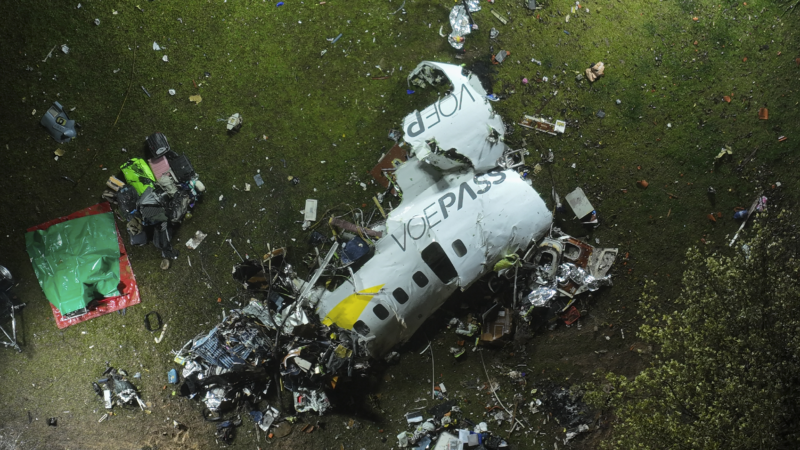Cockpit audio indicates issues with de-icing in deadly Brazil plane crash
SAO PAULO (AP) — The pilots of a Brazilian passenger plane that crashed last month, killing all 62 people aboard, reported failure in the system to remove ice from the plane, according to a preliminary report made public Friday.
Investigators in Brazil were careful to avoid saying this was the cause of the accident, and stressed there was more work to be done. Still, their report lent further credence to aviation experts’ main hypothesis: that the lift loss had been caused by ice formation on the plane’s wings and failure of its de-icing system.
Weather reports from the day of the accident predicted ice formation in the region where the plane went down.
Audio from the cockpit’s voice recorder included comments from pilots indicating ice was accumulating and there was a failure in the de-icing system, Paulo Fróes, an investigator in the the air force’s center for the investigation and prevention of air accidents, told reporters in Brasilia.
Just two minutes before the crash, the copilot said, “A lot of ice.”
The plane’s data recorder also indicated that its de-icing system, responsible for preventing ice build-up on wings, turned on and off several times, according to their report.
“There are still many doubts. This accident shouldn’t have happened, not in the conditions in which the plane was flying and was being operated. It had protection equipment,” said Carlos Henrique Baldin, head of the center’s investigation division.
Operated by the airline Voepass, the flight departed Aug. 9 from the city of Cascavel, in Parana state, bound for Sao Paulo’s Guarulhos international airport. It crashed into the backyard of a home in a gated community in the city of Vinhedo, about 80 kilometers (50 miles) northwest of the metropolis of Sao Paulo.
Footage of the ATR 72 twin-engine turboprop plunging while in a flat spin horrified people across Brazil.
“Based on the preliminary report, it isn’t possible to conclusively affirm that ice on the wings caused the accident, but there are indications ice formation was a significant contributing factor,” Henrique Hacklaender, the president of the national aviators’ union, told The Associated Press after the press conference.
Hacklaender said the ATR 72’s de-icing system is manually controlled by pilots, and the preliminary report reveals that it was activated during the flight, indicating an attempt to use it. However, the report doesn’t clarify if the system was actually employed, he added.
The air force’s center, known as Cenipa, is continuing its investigation into the cause of the accident with no set deadline for conclusions. They’re also collaborating with an ongoing Federal Police inquiry to determine if anyone is liable for the crash.
ATR is a French-Italian company. Its model 72 is generally used on shorter flights. The planes are built by a joint venture of Airbus in France and Italy’s Leonardo S.p.A. Crashes involving various models of the ATR 72 have resulted in 470 deaths going back to the 1990s, according to a database of the Aviation Safety Network.
It was the deadliest airline crash since January 2023, when 72 people died on board a Yeti Airlines plane in Nepal that stalled and crashed while making its landing approach. That plane also was an ATR 72, and the final report blamed pilot error.
An American Eagle ATR 72-200 crashed on Oct. 31, 1994, and the U.S. National Transportation Safety Board determined the probable cause was ice buildup while the plane was circling in a holding pattern. The plane rolled at about 8,000 feet (2,500 meters) and dove into the ground, killing all 68 people on board. The U.S. Federal Aviation Administration issued operating procedures for ATRs and similar planes telling pilots not to use the autopilot in icing conditions.
How to show platonic love
Loneliness can be just as bad for your health as smoking 15 cigarettes a day — which means that having friends might literally save your life. But often, we don't pay friendships the respect they deserve compared to romantic or familial relationships. In this episode, reporter Kavitha George talks with psychologist and friendship expert Marisa Franco about how to make more friends and deepen our preexisting friendships. This episode was originally published Sept. 13, 2022.
For people with opioid addiction, Medicaid overhaul comes with risks
More than a million Americans use Medicaid to get addiction treatments like methadone. But as states update their systems, some patients have lost coverage. Even a short gap can be life-threatening.
A celestial trifecta: What to know about Tuesday’s lunar eclipse
This month's harvest moon will not only coincide with a supermoon, but also with a blood moon and partial lunar eclipse.
When Wil was struggling with depression, a therapist said just the right thing
In 2014, Wil Davenport was being treated for depression at an inpatient mental health program. One day, his therapist issued a challenge that renewed his sense of purpose.
People who exercise have healthier belly fat, new study finds
Here's another good reason to keep exercising. A study finds people with obesity who exercise can store more fat under the skin instead of around their organs, which is much better for their health.
Her piano concert was six years in the making. Then Puerto Rico’s power went out
Puerto Rico’s unstable electric grid affects every sector of society, including the island’s rich cultural scene. An outage abruptly ended an emerging pianist’s recent concert, touching a nerve.








